The Reagan Recession was a difficult time for people graduating college, like me in 1982. Lacking connections and unsuited for decent employment anyway, I was fortunate to find a summer gig selling t-shirts and merch at an outdoor concert venue in Wisconsin. It was good money, it got me out of the sweltering city for a while, and it let me enjoy the largesse of my host, a friend from college.
When the Grateful Dead came through, we chortled about the antics of the Deadheads, like popping into the pro shop to ask if they could rent, not buy, a swimsuit. When Def Leppard came through on their first American tour, we sold out every last scrap of merch – misprinted or misfit, it didn’t matter: as long as the thong had a Union Jack printed on it, someone would buy it. I didn’t care much for Supertramp, but they were the only band who jammed in the resort bar after their concert, so props to them.
Amid the cornfields and golf courses, I learned about many things. Fan devotion. Capitalism. Artistic integrity and venality. Heat stroke. And the infernal afterlife portrayed in “Green Acres.”
“Green Acres”, on the air from 1967 to 1971, was one of the last cornpone television shows of that era, and possibly its most lunatic. It was too in-your-face ridiculous to attract a timid sitcom audience, and certainly too square for a hipper crowd, despite Eva Gabor’s out-of-place couture. But it was a strange and arresting locale, this Hooterville, a few pig farms down the road from Pixley and adjacent to Hell itself.
One night after hawking shirts to mildly high Go-Gos fans, a few of us merch entrepreneurs pounded gin and tonics in the resort bar ‘til last call. We were wired but had no place to go. In the rolling hills of rural southern Wisconsin, cow-tipping was the only available recreation. And listen, I was not some cheesehead junior college student at that point. I was a graduate of a Big Ten university!
We headed up to the hotel room, carrying pitchers of gin and tonics that looked craftily like water, except for the limes. At some point, my hyperactive college buddy – the one who certainly never needed cocaine – brought out the cocaine. Gin and blow provided a high-pitched brain whine, more pleasant than the hum of an airplane, that illuminates the most fugitive thoughts like a blue light in a tacky art shop.
In the background played the television that hung from the ceiling, while we jabbered and laughed and pontificated. Like most hotel TVs of the era, its controls were hidden. Beyond changing the channel and the volume, the viewer could adjust nothing. What you saw was what you got. In the grand era of the cathode ray tube, horizons wobbled like the deck of a schooner, the air was filled with flying hyphens and dashes, and colors could be a Warholian arcade.
At that hour of the morning, the only “entertaining” selection on the broadcast band was “Green Acres.”
The show’s ostensible premise: Oliver Wendell Douglas and his Hungarian socialite wife Lisa give up the glamorous life of the New York legal profession and relocate to a farm somewhere near a place called Hooterville. There, as stout yeopersons of the soil, the blessed stock of the American homeland, they experienced bad luck, agricultural famine and interactions with dimwitted locals.
The show’s actual premise, revealed on that early summer morning: Oliver Wendell Douglas is actually dead and suffering through a senseless rural purgatory, with no prospect of surcease until cancellation.
In Hooterville, not only did a season’s toil produce three carrot-sized ears of corn, but thanks to our TV, the sky burned red and people’s faces were blue, while pixelated locusts and ash filled the air. Not only did Oliver Douglas have to climb a pole to use the telephone, risking his neck because another 20 feet of telephone wire was nowhere in existence, everyone around could see him shimmy up there and wanted to know his business. Not only did Fred and Dorris Ziffel raise a pig as their own son, everyone except Oliver Douglas could understand what “Arnold” said.
The entire population of this mysterious county was in on the joke – the endless misunderstandings, the hidden codes, the sheer futility of everything – except Oliver Wendell Douglas.
The episode rerun on the night of this epiphany involved a song contest on the radio, WPIXL out of Pixley. Eb, the farm hand who for all purposes might have been a talking dog, is intent on winning the contest, in which the winner has to identify a series of songs from a small snippet played. Eb dutifully carries his portable radio with him all day.
And every clip the DJ plays is exactly the same, an inane riff of twangy electric guitars and bass harmonicas, the aural equivalent of the existential emptiness that haunts rural America and fuels Trumpism.
“That’s ‘You’re My Pizza Mama’!” Eb exclaims, and runs off to call the station.
Later, the same stupid clip plays, and Eb IDs it as, “You Must Be a Girl Because You’re Hair is Shorter Than Mine.”
Another, identical clip: “I’ve Got Knobs on My Knees from Riding a Surfboard with You!”
Douglas objects, “Wait, isn’t that ‘You’re My Pizza Mama’?”
Eb scoffs, “Boy, have you got a tin ear!”
The first-place winner of the song contest will win an all-expense-paid trip to Las Vegas, Illinois. Everyone finds this terribly exciting, except for Oliver Wendell Douglas, who stubbornly insists they must mean Las Vegas, Nevada. Again, what should be mundane appears perverted only to him. This elite lawyer, the man of argument and persuasion, who does his farm work in a three-piece suit and a homburg hat, has found his acumen, education and training worthless in this hellscape. A man of logic in a valley of madness.
After 4 different song reveals, complications ensue when Eleanor, the family cow – scrawny and ill, though like in Jack and the Beanstalk, the only source of protein on the farm – accidentally swallows the radio. From her ruminant stomach comes music, including the songs for the contest. The radio can be turned on and off by squeezing her teats, channels switched when she hiccups.
Of course, Eb loses the song contest, and is deprived of a once-in-a-lifetime excursion to Las Vegas, Illinois. Nothing can change dramatically in a sitcom. All the characters’ efforts, like ours, are in vain. They’ll return the next week to their regular positions, tormenting Oliver Wendell Douglas with their inanity. A reality he can’t even join, let alone decipher. His Sisyphean efforts come to nothing again, and the special purgatory – or is it hell? – of the sitcom rolls on.
Examining Douglas’ torments might provide hints at the sins he committed before he was condemned to his farm. In the second ring of Dante’s Inferno, the gluttonous are forced to wallow in and eat a vile icy slush of their own making – a parallel to Lisa Douglas’ inedible “hotscakes”, perhaps? We might speculate on accusations of fraud in his earlier legal career, might have involved charges of fraud, but no hideous demons chase him across the barren fields with whips and chains. The mortal sin most often displayed by Douglas is anger, though the typical punishment for wrath – drowning in the River Styx – is never used. Does America’s materialistic consumer culture even degrade the cosmological system of the immortal Florence poet? Are we only able to provide bad food, decaying architecture and talking pigs to torment the souls of the damned?
Broadening our afterlife search, we find Hinduism contains 27 different hells. It’s possible that Pixley got lost somewhere between Pathana and Kalasutra (huge numbers of souls to sort out, after all), but it doesn’t quite align. The levels of Islamic hell seem to apply even less in “Green Acres”, unless the Douglasses were secret Zoroastrians (if so, they’d better watch out!). The Judaic image of She’ol is of a dark, mirthless place, not exactly good farming conditions, nor does it come across well in sitcom Technicolor.
In the end, the hell of Oliver Wendell Douglas is one of his own making. After a life of arguing, debating, and teasing out the meaning from the minutiae of the law, he is stuck in a place where reasoning is futile, logic leads to endless frustration, and calm rationality has no place. Sartre argued that “Hell is other people.” This is also, quite possibly, the town motto of Hooterville.
I think of this epiphany often when driving down the highway today, through Indiana and other points south. You’ve seen the billboards:
“Which Do You Choose, Heaven or Hell?”
“If You Die Tonight, Heaven or Hell?”
“Hell is Real!”
Don’t laugh, they are nearer the mark than you think. It just strikes me as an odd way to advertise the local highlights.




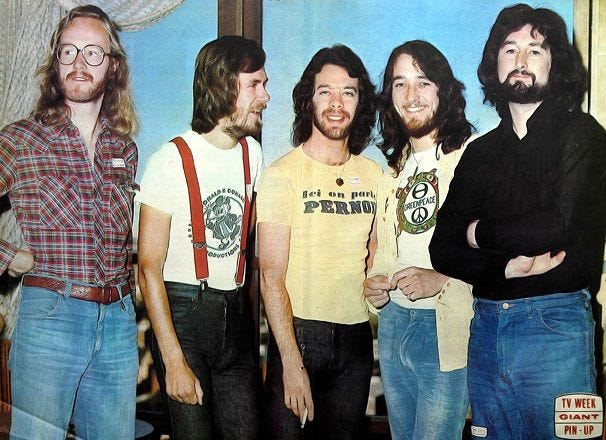
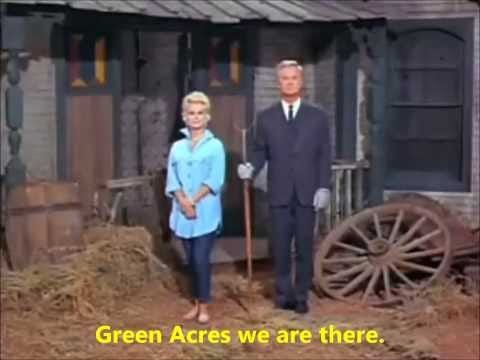


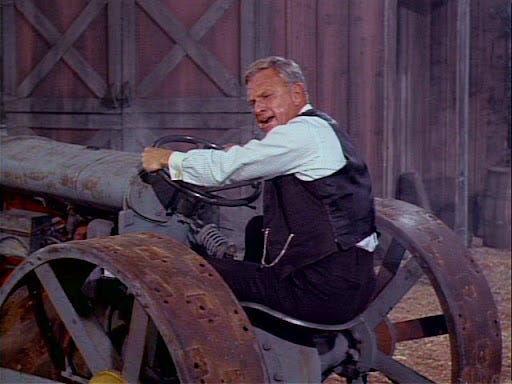
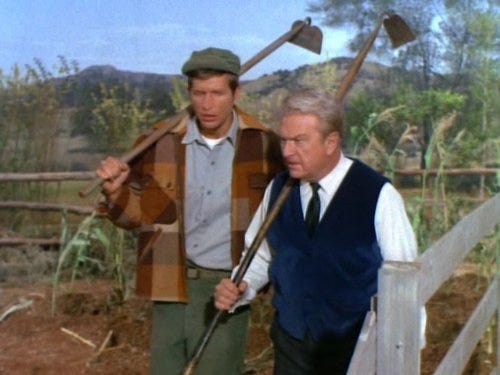
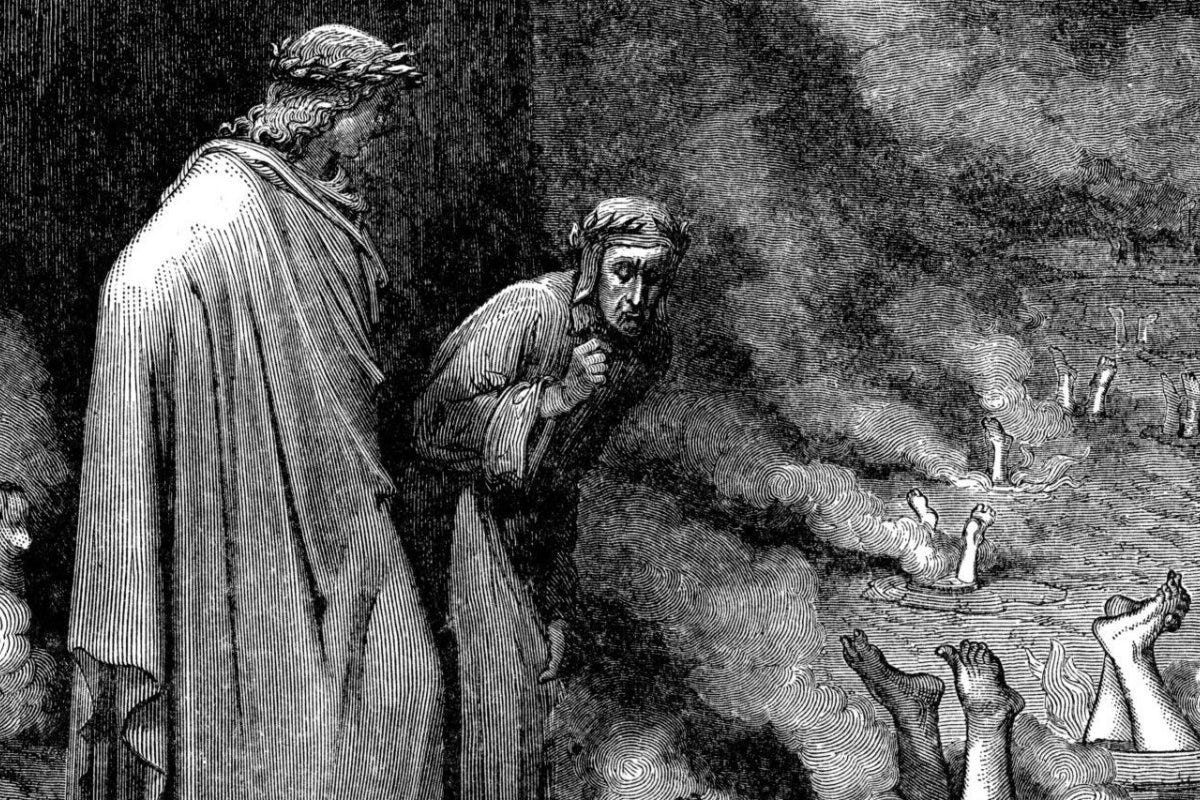
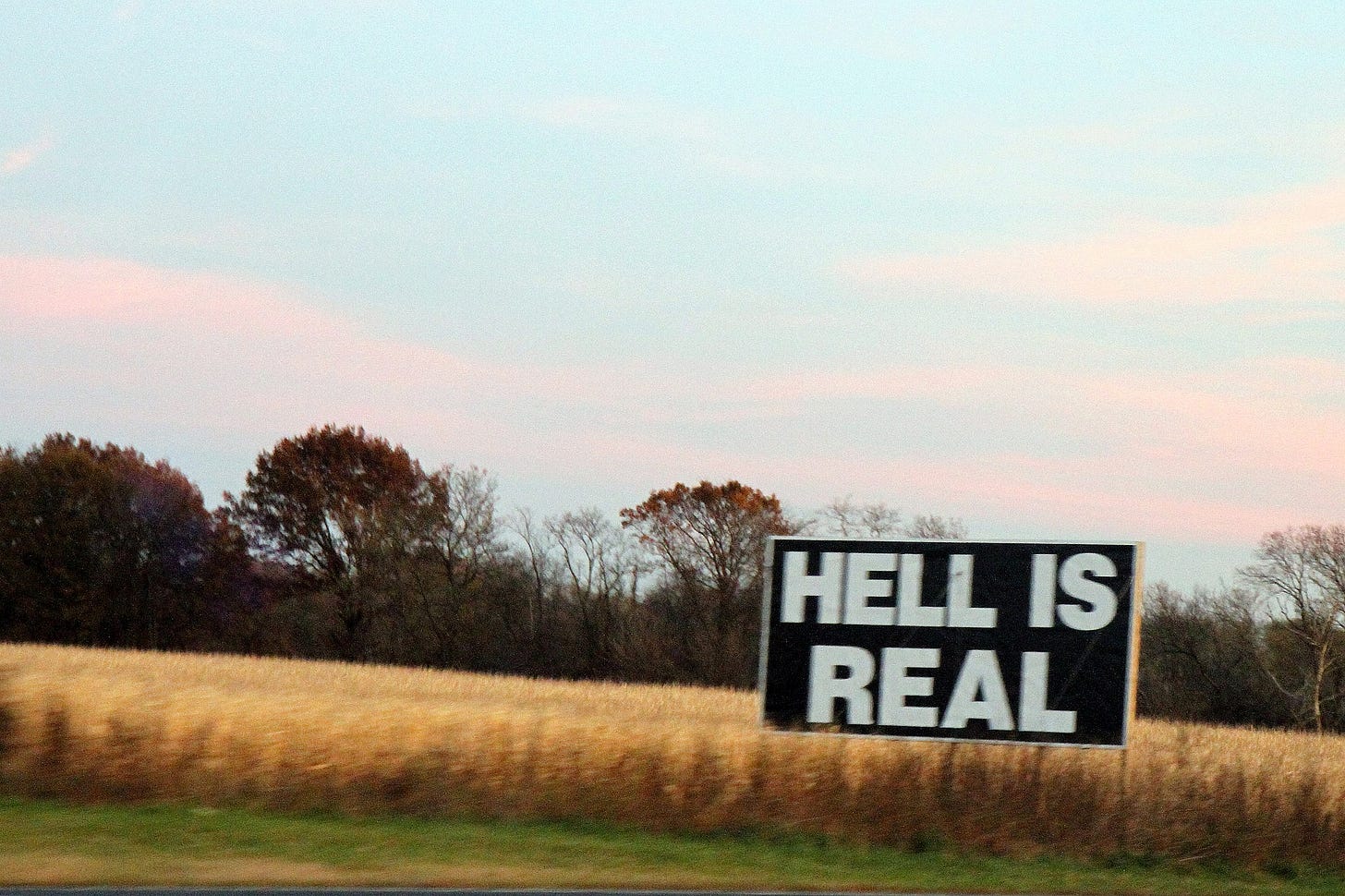
I've always argued that "Green Acres" is aburdist comedy worthy of an Ionesco play. From the book "Conversations with Eugene Ionesco" by Claude Bonnefoy: "These characters act as a foil. I use them to highlight the fantastic side because if you set realism aganst the unreal, you obtain a contrast which is also a union; in other words, the realism makes it easier to bring out the fantastic aspect and vice versa." That's "Green Acres." Also, with my parents having blessed me with an unsual forename (at least for a kid of my generation) it was inevitable that other kids gave me the nickname "Arnold the Pig." Yet it failed to make the intended dent in my ego, given my love then (and now) for the best example of absurdism outside of "The Bald Soprano" and "Rhinosaurus."
Your synopsis of the Green Acres episode reminded me why I loved that surreal comedy. Every summer, my parents took me to Connecticut to visit their farmer friends and I got to hang out with their kids and help with the chores. They all loved Green Acres in part because they loved to make fun of city folk! The other part was the county agent, Hank Kimble who was just as useless as their own county agent. I never before thought that Oliver might be dead and this was his own hell, but when you describe it, it makes sense. To this day, I can find Green Acres on the Pluto streaming service to take me back to the days when I was in High School.